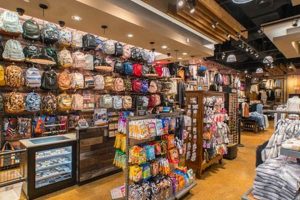An establishment in the Greater Boston area that specializes in the sale of skateboarding equipment, apparel, and related accessories. These stores cater to a diverse clientele, ranging from beginners to seasoned professionals, offering products and services tailored to various skill levels and skateboarding styles.
The presence of such businesses fosters the local skateboarding community, providing access to quality gear and expert advice. They often serve as hubs for skateboarders, contributing to the sport’s growth and development within the city through sponsorships, events, and workshops. The historical context of skateboarding in the region informs the unique character and product offerings of many of these retailers.
The following sections will delve into the specific types of products offered, the range of services available, and the role these establishments play in shaping the skateboarding landscape of the city.
Skateboarding Equipment and Maintenance Tips
Maintaining skateboarding equipment and selecting the appropriate gear are essential for safety, performance, and longevity of the board. The following tips provide guidance on these aspects.
Tip 1: Deck Inspection: Routinely examine the skateboard deck for cracks, chips, or signs of water damage. A compromised deck can lead to instability and potential injury during use. Replace damaged decks promptly.
Tip 2: Truck Tightness: Ensure the trucks are properly tightened. Loose trucks can cause wobbling, while overly tight trucks restrict turning ability. Adjust truck tightness based on personal preference and riding style, using a skate tool to make incremental changes.
Tip 3: Wheel Condition: Monitor wheel wear. Uneven wear or flat spots reduce grip and speed. Rotate wheels periodically to distribute wear evenly. Replace wheels when they become significantly worn or damaged.
Tip 4: Bearing Maintenance: Clean and lubricate bearings regularly. Dirt and debris impede bearing performance. Remove bearings from the wheels, clean them with a solvent, and re-lubricate them with skate-specific bearing lubricant.
Tip 5: Hardware Integrity: Check all nuts and bolts for tightness. Loose hardware can cause components to shift, leading to instability. Use a skate tool to tighten hardware before each session.
Tip 6: Grip Tape Adhesion: Inspect the grip tape for tears or loss of adhesion. Compromised grip tape reduces foot traction. Replace worn grip tape with a fresh sheet for optimal control.
Tip 7: Protective Gear: Always use appropriate protective gear, including a helmet, knee pads, elbow pads, and wrist guards. Protective gear significantly reduces the risk of injury during falls.
Proper maintenance and equipment selection contribute significantly to a safer and more enjoyable skateboarding experience. Adhering to these guidelines enhances performance and extends the lifespan of skateboarding equipment.
The subsequent sections will explore specific product categories and services offered.
1. Local Skateboarding Community
The presence of a thriving local skateboarding community is inextricably linked to the existence and function of skateboarding retailers within Boston. These businesses serve as more than just retail outlets; they are integral hubs that support and shape the culture of skateboarding.
- Community Hubs and Meeting Points
Skateboarding establishments frequently function as informal meeting places for skaters of all ages and skill levels. They provide a space for individuals to connect, share experiences, and learn from one another. Examples include shops hosting after-hours gatherings or organizing group skate sessions at local parks. This fosters camaraderie and strengthens the sense of community among skateboarders.
- Sponsorship and Event Support
Many skateboarding retailers contribute to the community by sponsoring local skateboarders, events, and competitions. This support can range from providing equipment and financial assistance to organizing and promoting events. Sponsorships aid emerging talent and contribute to the visibility and growth of the sport within the area. Event support provides platforms for skateboarders to showcase their skills and connect with fellow enthusiasts.
- Knowledge Sharing and Skill Development
The staff at skateboarding retailers often possess extensive knowledge of skateboarding equipment, techniques, and local spots. They can provide valuable advice to beginners, helping them select appropriate gear and learn fundamental skills. They can also guide experienced skateboarders to more advanced equipment. Shops also offer informal advice on tricks, skate spots, and skateboarding etiquette.
- Advocacy and Representation
Skateboarding retailers can advocate for the interests of the skateboarding community by engaging with local government and promoting the construction of skateparks and other skateboarding facilities. They can also represent the community’s voice in discussions about public space and regulations affecting skateboarding. This advocacy ensures that the needs and perspectives of skateboarders are considered in urban planning and policy decisions.
The contributions of these retailers significantly enhance the vibrancy and resilience of the local skateboarding scene. Without their support, the community would likely be less connected, less supported, and less able to advocate for its interests. These establishments are critical to the ongoing growth and development of skateboarding within the city.
2. Equipment and Apparel Sales
The sale of skateboarding equipment and apparel is a fundamental function of skateboard-related retail businesses in Boston. The availability of these products directly influences the ability of individuals to participate in skateboarding, and the selection offered by these establishments shapes the local skateboarding aesthetic and culture.
- Skateboard Components
These retailers provide a comprehensive range of skateboard components, including decks, trucks, wheels, bearings, and hardware. The quality and specifications of these components directly impact the performance and safety of a skateboard. Examples include decks made from various materials (e.g., maple, carbon fiber) offering different levels of durability and responsiveness, and wheels with varying durometers (hardness) suited for different terrains and riding styles. The availability of diverse components allows skateboarders to customize their setups based on personal preference and intended use.
- Protective Gear
The sale of protective gear, such as helmets, knee pads, elbow pads, and wrist guards, is essential for promoting safety within the skateboarding community. These items mitigate the risk of injury from falls and collisions. Skateboarding retailers often carry a range of protective gear options in various sizes and styles to cater to diverse needs and preferences. Promoting and providing access to protective gear is a vital role of these businesses.
- Apparel and Footwear
Skateboarding apparel and footwear are stylistic expressions of the sport’s culture and also offer functional benefits. Skate shoes are designed with reinforced construction and durable materials to withstand the wear and tear of skateboarding. Apparel often incorporates skateboarding-inspired graphics and designs. These sales contribute to the overall identity of skateboarders and support the skateboarding lifestyle.
- Maintenance and Repair Supplies
These retailers also offer maintenance and repair supplies, such as skate tools, bearing lubricant, replacement hardware, and grip tape. Providing these items enables skateboarders to maintain and repair their equipment, prolonging its lifespan and ensuring optimal performance. The availability of these supplies is essential for independent skateboarders who prefer to handle their own equipment maintenance.
The comprehensive offering of equipment and apparel by skateboarding retailers in Boston is crucial for supporting the skateboarding community. These businesses not only provide access to essential products but also contribute to the overall culture and identity of skateboarding within the city. The range of products available directly influences the accessibility, safety, and style of skateboarding practiced in the region.
3. Skateboard Repair Services
Skateboard repair services represent a crucial element of operations for skate shops within Boston. The correlation stems from the inherent need for skateboard maintenance and the specialized knowledge required to execute it effectively. The causal relationship is evident: skateboarding, by its nature, subjects equipment to wear and tear, necessitating repair services. A skate shop offering these services demonstrates a commitment to customer support beyond mere product sales, fostering customer loyalty and contributing to the sustainability of the skateboarding community.
Furthermore, skateboard repair services within these stores often serve as educational opportunities. Skilled technicians can advise customers on preventative maintenance, optimizing performance, and prolonging the lifespan of their boards. For instance, a common repair involves replacing worn bearings, a task a shop technician can demonstrate while explaining the importance of bearing lubrication. This service enhances customer understanding and promotes responsible skateboarding practices. Shops that offer these services contribute to the development and growth of the skateboarding scene.
In conclusion, skateboard repair services are not merely an ancillary offering but an essential component of skate shops. These services provide tangible benefits to skateboarders through maintenance and repair, promote education on the equipment and the sport, and bolster the overall health and sustainability of the skateboarding community. The availability of reliable repair options allows skateboarders to maintain equipment to operate smoothly, safely, and sustainably, which ultimately helps create a wider and more supportive skateboarding ecosystem.
4. Knowledgeable Staff Expertise
Expertise of personnel within skateboarding retail establishments in the Greater Boston area significantly influences the quality of service and the customer experience. Staff competency directly correlates with customer satisfaction, equipment selection, and overall participation in the skateboarding community.
- Product Recommendation and Selection
Knowledgeable staff members can provide informed recommendations based on individual skill levels, riding styles, and preferences. For example, a staff member familiar with different deck constructions can advise a beginner on a durable and stable board, or guide an experienced skater towards a deck with specific flex characteristics. Such personalized advice ensures customers acquire appropriate equipment.
- Technical Support and Troubleshooting
Experienced staff can diagnose and resolve common skateboarding equipment issues. Examples include identifying the source of wheel wobble, adjusting truck tightness for optimal turning, or advising on bearing maintenance. The ability to provide effective technical support reduces equipment downtime and enhances the overall skateboarding experience.
- Safety Guidance and Best Practices
Staff expertise extends to promoting safe skateboarding practices. Employees can emphasize the importance of protective gear, provide guidance on proper riding techniques, and advise on selecting appropriate skate spots based on skill level. Promoting safety minimizes the risk of injury and fosters a more responsible skateboarding culture.
- Community Knowledge and Local Spot Intel
Personnel often possess extensive knowledge of the local skateboarding community and popular skate spots. This enables them to connect customers with local events, groups, and resources. Providing information about skatepark etiquette, hidden spots, or local competitions fosters a sense of community and enhances the skateboarding experience.
The expertise of staff within a skate shop impacts multiple aspects of skateboarding, from equipment acquisition to safety practices and community engagement. Competent personnel contribute to customer satisfaction, promote responsible skateboarding, and strengthen the local skateboarding scene.
5. Brand and Product Variety
The assortment of brands and product types offered by skateboarding retailers in the Boston area directly influences their appeal and functionality within the local skateboarding ecosystem. The variety available is a consequence of the diverse needs and preferences of the skateboarding population, which encompasses individuals with varying skill levels, styles, and financial constraints. A skate shop’s ability to cater to this heterogeneity is directly proportional to its success in attracting and retaining customers. For example, a store that carries a range of deck sizes, wheel durometers, and truck brands allows skaters to fine-tune their equipment to specific riding conditions and personal preferences.
Furthermore, the presence of both established and emerging brands fosters innovation and competition within the market. Skate shops that feature a mix of well-known brands alongside smaller, independent manufacturers often expose their clientele to new technologies, designs, and product philosophies. This exposure can lead to greater experimentation and evolution within the local skateboarding scene. For instance, a skate shop might carry established brands like Vans and Santa Cruz alongside smaller, local deck companies, providing customers with both trusted reliability and unique, locally-sourced options. This variety provides economic opportunities for independent artists and small businesses while providing consumers with specialized products that often arent available from big box stores.
In summary, brand and product variety is a crucial determinant of a skate shop’s role and relevance within the Boston skateboarding community. It contributes to customer satisfaction, fosters innovation, and provides economic opportunities for independent businesses. Understanding the nuances of this connection is important for business strategy, community support, and the continuing development of local skateboarding culture, with an expansive brand selection the skate shops are able to serve as a resource for new skaters all the way to experienced individuals.
Frequently Asked Questions Regarding Skateboarding Retailers in Boston
This section addresses common inquiries regarding retail establishments specializing in skateboarding within the Boston metropolitan area.
Question 1: What distinguishes a dedicated skateboarding shop from a general sporting goods store when purchasing skateboarding equipment?
Dedicated skateboarding shops offer specialized knowledge, a curated selection of high-quality skateboarding-specific products, and expert advice tailored to individual needs and skill levels. General sporting goods stores often lack the depth of product knowledge and specialized inventory necessary for informed skateboarding purchases.
Question 2: What range of price points can one expect when purchasing a complete skateboard from a Boston-area retailer?
The price of a complete skateboard varies depending on the quality of components and brand. Entry-level complete skateboards typically range from $80 to $150. Higher-end complete skateboards, featuring premium components, can range from $200 to $400 or more. Price depends on the deck, wheels, trucks, bearings, and other components.
Question 3: Do skateboarding retailers in Boston typically offer lessons or workshops for beginners?
Some retailers offer lessons or workshops, though this varies by establishment. Contacting individual shops directly is recommended to inquire about available instruction and associated fees.
Question 4: Are there specific skateboarding shops in Boston that specialize in particular styles of skateboarding, such as street, vert, or longboarding?
While many shops cater to a broad range of skateboarding styles, some may have a stronger emphasis on specific disciplines. Inquiries regarding specialization are advised when selecting a retailer based on specific needs or riding styles.
Question 5: How often should one replace the various components of a skateboard, and do “skate shop boston” locations offer repair services?
Component replacement frequency depends on usage and wear. Decks typically last several months to a year, while wheels and bearings may require more frequent replacement depending on riding conditions. Trucks are generally durable and may last for several years. Many retailers offer repair services for component replacement and other maintenance needs.
Question 6: What are the common brands of skateboards or skateboarding components carried in “skate shop boston” locations?
Typical shops carry well-known brands such as Baker, Birdhouse, Santa Cruz, Anti Hero, Real, and Almost. They often carry brands like Independent, Venture, and Thunder for trucks and Bones, Spitfire, and OJ Wheels for wheels. The brands will vary according to each location.
The answers provided are intended to offer general guidance. Consultation with experienced skateboarders or shop personnel is recommended for more specific advice.
The following sections will delve into specific product categories and services offered.
Conclusion
This exploration of skate shop boston has illuminated its multifaceted role within the city’s skateboarding ecosystem. Beyond mere retail outlets, these establishments function as community hubs, knowledge centers, and service providers. Their impact extends from equipment provision and skill development to fostering a shared identity and advocating for the sport’s interests.
The continued presence and evolution of skate shop boston are vital for the sustained growth and vibrancy of skateboarding within the region. Supporting these businesses ensures the availability of essential resources, promotes a culture of safety and innovation, and strengthens the bonds of the skateboarding community. The future of skateboarding in Boston hinges, in part, on the continued success and adaptation of these important establishments.







